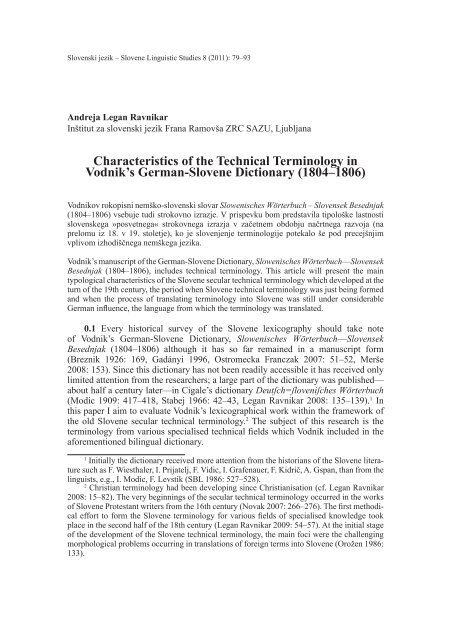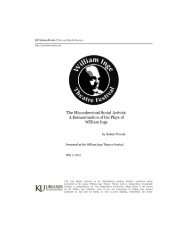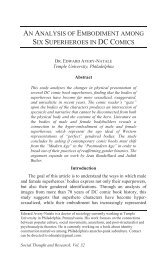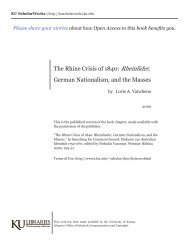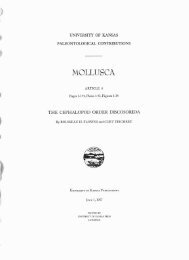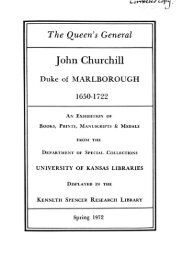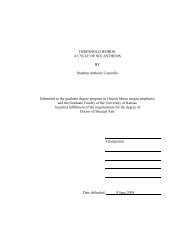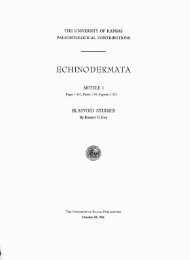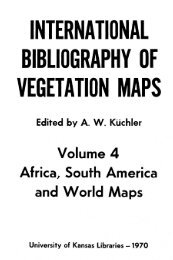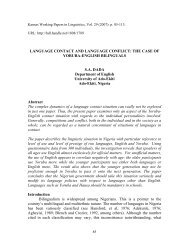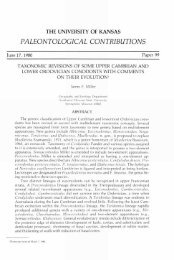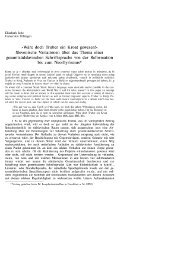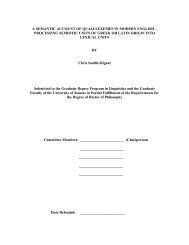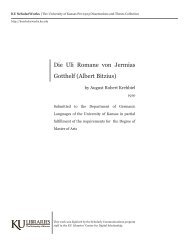Slovenski jezik Slovene Linguistic Studies - KU ScholarWorks
Slovenski jezik Slovene Linguistic Studies - KU ScholarWorks
Slovenski jezik Slovene Linguistic Studies - KU ScholarWorks
You also want an ePaper? Increase the reach of your titles
YUMPU automatically turns print PDFs into web optimized ePapers that Google loves.
<strong>Slovenski</strong> <strong>jezik</strong> – <strong>Slovene</strong> <strong>Linguistic</strong> <strong>Studies</strong> 8 (2011): 79–93<br />
Andreja Legan Ravnikar<br />
Inštitut za slovenski <strong>jezik</strong> Frana Ramovša ZRC SAZU, Ljubljana<br />
Characteristics of the Technical Terminology in<br />
Vodnik’s German-<strong>Slovene</strong> Dictionary (1804–1806)<br />
Vodnikov rokopisni nemško-slovenski slovar Slowenisches Wörterbuch – Slovensek Besednjak<br />
(1804–1806) vsebuje tudi strokovno izrazje. V prispevku bom predstavila tipološke lastnosti<br />
slovenskega »posvetnega« strokovnega izrazja v začetnem obdobju načrtnega razvoja (na<br />
prelomu iz 18. v 19. stoletje), ko je slovenjenje terminologije potekalo še pod precejšnjim<br />
vplivom izhodiščnega nemškega <strong>jezik</strong>a.<br />
Vodnik’s manuscript of the German-<strong>Slovene</strong> Dictionary, Slowenisches Wörterbuch—Slovensek<br />
Besednjak (1804–1806), includes technical terminology. This article will present the main<br />
typological characteristics of the <strong>Slovene</strong> secular technical terminology which developed at the<br />
turn of the 19th century, the period when <strong>Slovene</strong> technical terminology was just being formed<br />
and when the process of translating terminology into <strong>Slovene</strong> was still under considerable<br />
German influence, the language from which the terminology was translated.<br />
0.1 Every historical survey of the <strong>Slovene</strong> lexicography should take note<br />
of Vodnik’s German-<strong>Slovene</strong> Dictionary, Slowenisches Wörterbuch—Slovensek<br />
Besednjak (1804–1806) although it has so far remained in a manuscript form<br />
(Breznik 1926: 169, Gadányi 1996, Ostromecka Franczak 2007: 51–52, Merše<br />
2008: 153). Since this dictionary has not been readily accessible it has received only<br />
limited attention from the researchers; a large part of the dictionary was published—<br />
about half a century later—in Cigale’s dictionary Deutſch=ſloveniſches Wörterbuch<br />
(Modic 1909: 417–418, Stabej 1966: 42–43, Legan Ravnikar 2008: 135–139). 1 In<br />
this paper I aim to evaluate Vodnik’s lexicographical work within the framework of<br />
the old <strong>Slovene</strong> secular technical terminology. 2 The subject of this research is the<br />
terminology from various specialised technical fields which Vodnik included in the<br />
aforementioned bilingual dictionary.<br />
1<br />
Initially the dictionary received more attention from the historians of the <strong>Slovene</strong> literature<br />
such as F. Wiesthaler, I. Prijatelj, F. Vidic, I. Grafenauer, F. Kidrič, A. Gspan, than from the<br />
linguists, e.g., I. Modic, F. Levstik (SBL 1986: 527–528).<br />
2<br />
Christian terminology had been developing since Christianisation (cf. Legan Ravnikar<br />
2008: 15–82). The very beginnings of the secular technical terminology occurred in the works<br />
of <strong>Slovene</strong> Protestant writers from the 16th century (Novak 2007: 266–276). The first methodical<br />
effort to form the <strong>Slovene</strong> terminology for various fields of specialised knowledge took<br />
place in the second half of the 18th century (Legan Ravnikar 2009: 54–57). At the initial stage<br />
of the development of the <strong>Slovene</strong> technical terminology, the main foci were the challenging<br />
morphological problems occurring in translations of foreign terms into <strong>Slovene</strong> (Orožen 1986:<br />
133).


